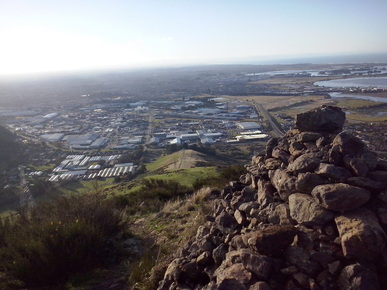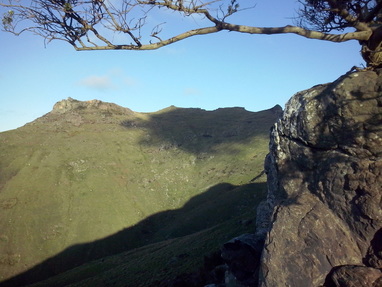|
I sat in front of my clinical supervisor for my fortnightly meeting in which I was supposed to talk about how I was coping, and how my work helping others was going. “I’m feeling really stressed at the moment.” I started off by saying. This was not an unusual way for me to start supervision sessions. I was hesitant to even bring this up, because I’d talked about my work stress often before and things didn’t seem to be any better for doing so. “How would you rate your stress from 1-10 at the moment?” She asked me in response. “I’d say an eight.” “Eight’s pretty high.” She said, then asked: “What are you doing for self care.” I rattled off a few things I was already doing, meditation, running, spending time in nature. All of the right answers, but I was already doing these things, and was still feeling stressed, and truth be told, pretty unhappy. I quietly despaired, pretended that I’d have a go at the further suggestions for self care that she made, and changed the topic to the work I didn’t want to do with drug and alcohol addicted citizens of West Auckland, who mainly didn’t want to get state mandated help from me, either.
Eventually, sick enough of the work and the workplace that skipped over the surface of the real social and personal issues, I left, a decision I never regretted for an instant. Looking back, I see this experience of so-called self care as actually being the managing of both clinicians and citizens - a substitute for real connection and healing, and certainly a substitute for addressing the disempowerment of both workers and the poor of West Auckland. Read the rest of the article by Michael Apathy here...
0 Comments
 This post isn't about some new idea in psychotherapy or counselling, or about the psychology of the social or environmental issues we collectively face. It's about the afternoon that I spent yesterday taking some of my own medicine - a dose of ecotherapy. The first thing I want to say is that it's so strange, that it takes getting a bit sick and run down and feeling like I have to stop running in the rat race, to actually give myself something different. Weaving through traffic and the unexpected traffic jams, I felt like I was making a prison break. I half expected that some last work commitment or emergency would stop me from getting to the start of the trail I was headed to at the base of the port hills. In hindsight I was actually worried that I'd flake out without a good excuse, and then have to face having sabotaged my own aspiration without even having an external barrier as a justification. As I began to walk up the gentle (and then steep) uphill start of the trail, this slightly urgent anxiety to escape began to relax as I felt committed to the trail and direction I had selected. Soon this commitment began to shift to excitement and desire to see the view from the next crest of the hillside. I could feel my empty physical and emotional gas tank begin to refill. Pausing often, to turn around look behind, I began to get perspective on the city. No longer a trapping and limiting, stress and anxiety provoking maze through which I madly run, Christchurch had become a sweeping vista. As I continued to climb, being an ecotherapist, I kept tuning in to the mental and emotional shifts that were happening inside of me. I noticed that as I began to sweat and glow from the climb, I began to feel more robust and confident, feeling my own capacity to work and progress and rise up over my previous foul mood. By the time I had reached the top I had also reached within myself a strong feeling of gratitude. This gratitude was towards myself, for having given myself this experience and worked for it, but also for having the amazing geography of the port hills so close by. The thought occurred to me: "I am made for this." And I think that's true. I, and you, were made to move through landscapes and to work physically, roam, to find new paths, and to trust the instincts of the body rather than a schedule or a fluorescent office environment. I don't happen to believe that a personal deity came along and made this world to suit my needs, but it's a pretty good moment when I spontaneously find myself feeling that evolution made me to enjoy walking, looking out at views, and feeling the wind on my face. The descent felt less ecstatic, but still important. I'm not going to live the rest of my life (or even much of it) out on a hillside, as much as I can love it for a while. The impulse to escape the city had shifted to a readiness to return, a sense of warmth and tolerance towards the people and activities that I had needed a break from. Descending is not about ecstasy, it is about careful details of placing a foot in such a way that we do not slip or turn an ankle. As much as the details of my life persecute me at times, it was good to feel ready for rather than resistant to the painstaking detailed work of descending. I'm glad to be able to share this experience with you through this blog post, but I'd like to take this further. A hell of a lot of research and my own experience tell me that those of us who struggle with issues such as anxiety or depression will find this sort of experience at least as beneficial as sitting in a therapy room with me. I look forward to starting up ecotherapy experiences this spring, so stay tuned for that! So I came to get therapy to deal with my relationship, my depression, my anxiety, my life crisis... what's all this about ecotherapy? Why should I connect more with nature?
My first answer to this question is you don't have to do anything! Lucid clinicians offer a range of modalities and approaches, only one of which is ecotherapy. It's up to you. But, for those with some curiosity, read on, because ecotherapy is not what you think, and might be relevant to your life than you'd think. Sitting still is hard. I feel qualified to say this, having done my fair share of retreats involving sitting very still and being aware for hours on end. It's particularly hard when we feel agitated or anxious, as many who seek therapy initially feel. It's harder yet for a lot of men to sit still and talk from the heart, to look into another person's eyes and reveal what we've been ashamed to reveal. It's hard to sit still if you're a teenager, to sit in someone else's world, an office which is designed to evoke an adult professional world that you don't belong to and that you're not sure you ever want to belong to. It's probably hard for a lot of other people, for a lot of other reasons, too. But you get the idea. What if that teenager could take their therapist to that hill that he found late one night, where he looked out at that view of the city lights that made him hope that his dreams weren't so stupid after all, if he could just dare to believe that someone would listen to them? What if that anxious and agitated person could walk up and down a big grassy field with a therapist who would help her to experience for the first time her ability to soothe herself through the rhythm of walking, and the way in which a large open space can help her put the crowd of anxious thoughts in perspective? What if that man could tell his story without resorting to masks and without having to deal with another's gaze, whilst staring out and talking with the sea as his witness, side by side with a therapist who would wait until he had said all he needed to say and until he turned and asked him, so what do you think? These are just some of the possibilities for working in therapy in a way that makes use of our environment, rather than shutting it out. That said, ecotherapy can also take place in therapy consulting rooms, and can look like a lot of things other than the examples above. Let me know via the comments section, what do you think about these examples? I'd love to hear. Subscribe or check back in for part two, soon. |
AuthorsMichael Apathy and Selina Clare are practitioners of psychotherapy at Lucid who are excited about fresh, innovative, and effective therapy for individual and environmental change. Categories
All
Archives
December 2016
|
Specialty Areas |
Online BookingBook my first session.
If there are no bookable services showing via the online booking website, this means we currently have a waiting list for new clients. Please give us a call or email if you would like to add your name to it. |

 RSS Feed
RSS Feed